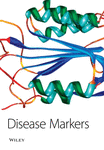Cancer Diagnosis, Risk Assessment and Prediction of Therapeutic Response by Means of DNA Methylation Markers
Abstract
Epigenetic alterations are heritable changes in gene expression without an accompanying change in primary DNA sequence. Two major mechanisms that cause epigenetic changes are post-translational histone modifications and DNA methylation at cytosine bases within a CpG dinucleotide. Epigenetic defects have turned out to be one of the most common molecular alterations in human neoplasia. Promoter hypermethylation is associated with loss of expression of tumour suppressor genes in cancer. The analysis of aberrant DNA methylation is gaining strength in the fields of cancer risk assessment, diagnosis, and therapy monitoring in different cancer types. These issues are discussed in this review.




